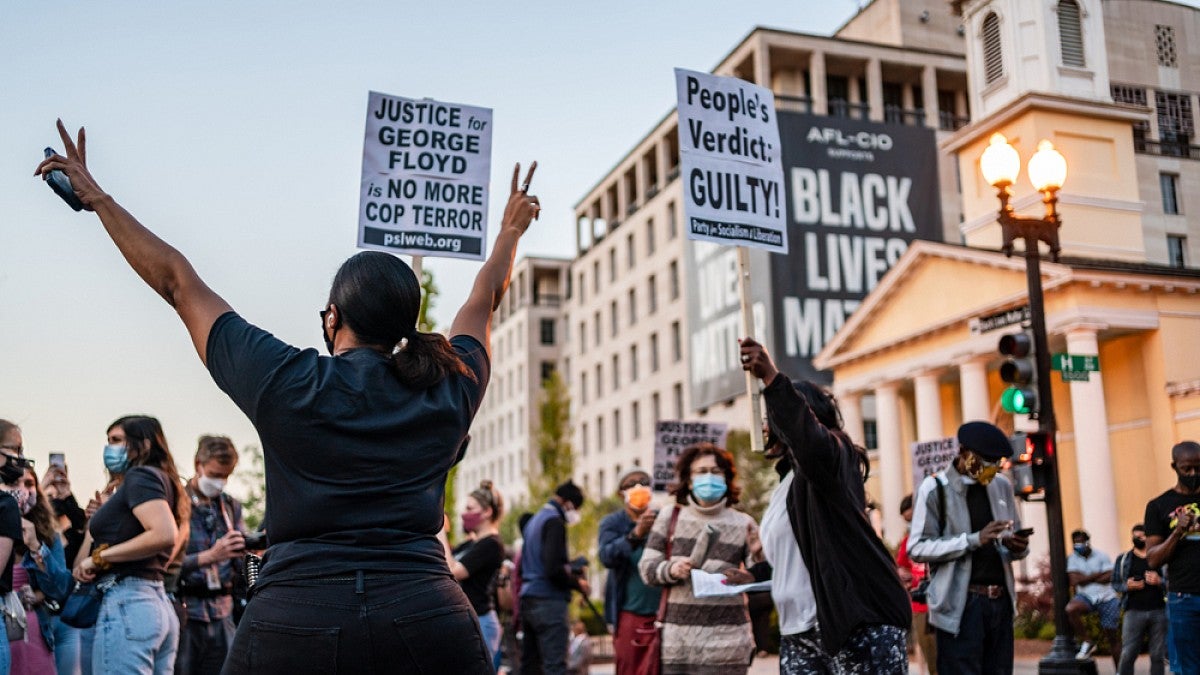This week’s guilty verdict of a Minneapolis police officer for the murder of George Floyd provides some measure of justice, but there is much more work to do to in holding police accountable for misconduct, UO law professor Jennifer Reynolds said.
“Even though this horrific event never should have happened, and even though the verdict cannot undo this tragedy or fix all the underlying problems that culminated in this crime, the system reached the right result,” she said.
Reynolds is associate dean of faculty research and programs and faculty director of the Appropriate Dispute Resolution Center at the UO School of Law. Her research interests include plea bargaining, and next year she will be co-teaching a new plea bargaining seminar.
Like many Americans, Reynolds said she was relieved Tuesday when a Hennepin County jury found Minneapolis police officer Derek Chauvin guilty of second-degree murder, third-degree murder and manslaughter.
“Like so many people, I felt like I knew what the verdict should be but was afraid that it would turn out differently,” she said.
Marcilynn Burke, the law school dean and Dave Frohnmayer Chair in Leadership and Law, said she was awaiting the verdict with some trepidation, followed by great relief when it was announced. But in a message to the law school community posted after the trial’s end, she stressed that much work remains to be done.
“As we readied ourselves for the verdict and as significant as it is, we know that the outcome does not change the ongoing need for racial justice and the need to re-imagine our institutions through an antiracist lens,” she wrote. “Though we appropriately pause today, we must not sit back and rest on this verdict. Instead, we should accelerate our work.”
The swiftness of the verdict — the jury deliberated for just over 10 hours — and Chauvin’s conviction on all three counts was not surprising as a legal matter because the issues were not complicated and the state’s case was strong, Reynolds said.
“The only question was whether the jury was going to ignore the evidence, which history has shown us can happen,” she said.
While the evidence against Chauvin was strong, most notably in the form of a nine-minute video showing Chauvin kneeling on Floyd’s neck until he died, juries often tend to give police officers the benefit of the doubt, Reynolds said.
“With this in mind, the prosecution had to make sure that they did not come across as anti-police,” Reynolds said. “So they emphasized that policing is a ‘noble profession’ and that Derek Chauvin is a disgrace to that profession. I think the prosecution made the distinction skillfully.”
Key testimony for the prosecution came from Chauvin’s fellow police officers, including his chief, which provided important context about police training and what reasonable responses may look like. That testimony also prevented the case from devolving into a pro-police versus anti-police dynamic, she said.
“The jurors were able to see their task as evaluating the behavior of a particular individual in a particular situation, not making a judgment on policing in general,” Reynolds said.
It was also important for the prosecution to emphasize the horror and reality of the video, telling jurors to “believe your eyes.”
Chauvin’s conviction is not unprecedented, but it is rare for police to be convicted of murder or manslaughter. A research project conducted jointly by the Police Integrity Research Group at Bowling Green State University and the Washington Post examined the outcomes of cases of deadly police shootings. They found that from 2005 to 2019, 104 nonfederal police officers were arrested for murder or manslaughter for on-duty deadly shootings. Of those, 35 were convicted of a crime, and just four were convicted of murder.
Reynolds said she was hopeful the verdict will be seen “as evidence of a real commitment in the United States to addressing historic inequities, promoting a positive vision of policing within our communities, and creating a more just society.”
—By Tim Christie, University Communications


